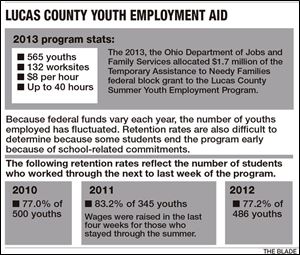
Lucas Co. effort helps youths get job experience
8-week summer work program funded by U.S. stimulus dollars
7/15/2013
Jack Nagy, 18, says his experience restocking rooms at ProMedica Bay Park Hospital has helped cement his career plans to study nursing at the university of Toledo.
THE BLADE/AMY E. VOIGT
Buy This Image

Jack Nagy, 18, says his experience restocking rooms at ProMedica Bay Park Hospital has helped cement his career plans to study nursing at the university of Toledo.
As persistently slow and discouraging employment conditions continue to paint a bleak future for the nation’s youths, local summer employment programs for young adults could not have come at a better time.
A July 5 national jobs report released by the U.S. Bureau of Labor Statistics shows that national unemployment rates for youths in June, 2013, were nearly double and triple that of overall unemployment rates. And in Ohio last year, teens and young adults were nearly one-and-a-half to two-and-a-half times as likely to struggle finding work compared to the total state labor force.
But in Lucas County, federal stimulus dollars have helped employ 565 low-income young adults this summer. The Lucas County Summer Youth Employment Program has been challenged with obstacles in its five-year existence — including reduced funds in 2011 — but organizers say this year’s program may be its strongest yet.
PHOTO GALLERY: Lucas County summer youth jobs
“We think we’re one of the best in the state,” said Pete Gerken, a Lucas County commissioner and former autoworker. “This is a positive program worth the community’s investment.”
The eight-week summer program began June 17 and is being funded with $1.7 million in federal Temporary Assistance for Needy Family funds. Coordinated by the Lucas County Workforce Development Agency, those involved are building job skills at 132 nonprofits, private business, and public administration work sites.
As early as 7:30 and 9 a.m., the youths employed at the Believe Center get to work.
The growing, green tomatoes will be ready for harvest in nearly two weeks, and a four-person team is needed to lift the garden trellises higher. They checked the nine-week old raised garden beds for dead, yellow-stained leaves, pulled pesty weeds, watered plentiful plants, and nailed wooden boards.
For first-time community gardener Ari Baer, 18, whose responsibilities at the community center have included gardening and cutting grass on vacant lots, the work has helped build his resume and prepare for trade school in Nashville this fall.
Julien Barhill said the summer employment has allowed him to forgo a truck job. Instead of being on the road and away from his family for 300 days a year, the 23-year-old West Toledo resident can take care of his 3-year-old son and baby daughter.
“This job is helping me give back to youth and support my children. It has been a blessing for me, and I am grateful to be in this program,” he said.
For decades, summer employment of youths has declined nationwide.
Anthony Carnevale, the director and research professor of the Georgetown University Center on Education and the Workforce, echoed these concerns.
“We’ve had a substantial falloff in youth employment for decades. The reason for this is that the general skills for entry-level positions have grown rapidly,” he said. “Youth unemployment is cyclical ... in a recession, it’s more difficult."

Tourism jobs help
Although Mr. Carnevale said a local labor industry is important — markets with summer tourism, for example, can hire more young adults — as the economy recovers, labor market conditions for young people should improve.
The Ohio Department of Jobs and Family Services has dedicated millions from stimulus dollars in 2009 and public assistance dollars in 2010, 2012, and 2013 to subsidize summer youth-employment programs in 73 Ohio counties.
Counties are not required to offer such programs, but child poverty has long been a concern in Lucas County. For the last five years, the Workforce Development Agency and county commissioners have coordinated more than 2,800 summer-youth jobs.
And as long as a youth’s family earns within 130 percent of the poverty line, Mr. Gerken said the program will not turn away eligible workers.
40-hour week
Mr. Baer said without this opportunity, he might have been on the couch at home all summer, playing computer games. Instead, the three-time program participant is working a maximum 40 hours per week at $8 an hour to help his mom support his younger brother and sister.
According to Benjamin Johnson, spokesman at the Ohio Department of Jobs and Family Services, the short-term benefits of summer programs are threefold.
First, they provide work to a population that struggles to get meaningful job experience. Second, because young adults have a qualified need, they immediately can spend or save earned income as they would like.
And third, costs covered with federal dollars make it possible for employers to add summer staff, without replacing full-time workers.
Earlier this month, Commissioner Carol Contrada called the program a “win-win-win” for the youth, community, and employers.
Supervisors at three randomly selected work sites, interviewed two weeks after the program began June 17, said their experiences have been nothing but positive.
But in 2009, the county program made its debut to mixed reception. Some of the workers had good experiences. Others dropped out, and some employers complained that those assigned to their site could not perform basic tasks, were unwilling to work, or would show up late or not at all.
Five-time participating employer Tracey Jacob, who has supervised a total of 25 students at sites that include an automotive supplier and an envelope firm, said the program is effectively managed. Job coaches will randomly check in with employers and workers every other week and will switch those to other work sites “on the spot” if the relationship isn’t a good match.

‘Real lessons of life’
Not every experience has been perfect, Ms. Jacob added, but if supervisors are willing to supervise, the program can be valuable to all.
“Sometimes, kids need to mature quickly and be educated on a remedial level. They’re learning the real lessons of life in a short period of time. At the same time, there’s more effort that comes with that, but the value has got to be there,” she said.
The program teaches young adults the rules of the workplace and how to be responsible, as well as how to apply for jobs online, build resumes, and interview.
And because the agency and county evaluate the program each year, Mr. Gerken said it has constantly evolved.
In addition to conducting post-employment interviews with employers to ensure that they are benefiting from the experience and properly supervising workers, he said student post-employment evaluations have taught the agency that transportation issues the first year prevented many from arriving to work on time or getting there at all.
Mr. Gerken said work force staff now assign the young adults to work sites according to their interests and access to transportation. They also guide the workers with ways of properly handling their money.
The county program has been an important learning opportunity for low-income workers and last year, Toledo Mayor Michael Bell asked local businesses to “step up” and help provide jobs.
Community-based organizations responded by participating in several job fairs and contributing donations. City spokesman Jen Sorgenfrei said some organizations, particularly ProMedica, answered Mayor Bell’s challenge by enhancing their own summer-employment programs.
Ms. Sorgenfrei said ProMedica, which this year has formed a partnership with United Way, has provided students not only with summer jobs but also with exposure to a spectrum of opportunities in the health-care industry.
Jack Nagy, 18, who graduated from high school with plans to study nursing at the University of Toledo this fall, said his part-time work experience stocking rooms with supplies, checking equipment, and speaking with patients has confirmed his career ambitions.
Students are working both in clinical and nonclinical components of health care, said Luke Barnard, ProMedica’s manager of work force planning.
“We want to grow workers for the future and help them get through the door.”
Contact Danielle Trubow at: dtrubow@theblade.com or 419-724-6050 or on Twitter @danielletrubow.